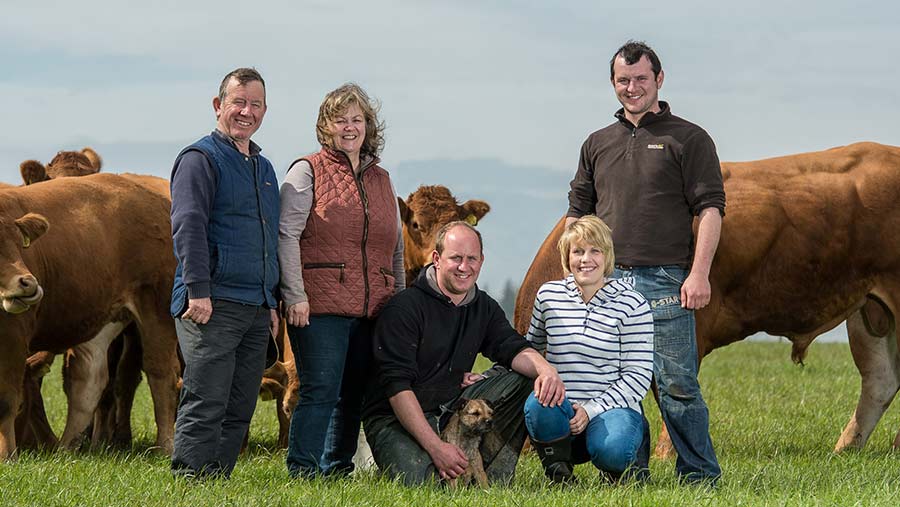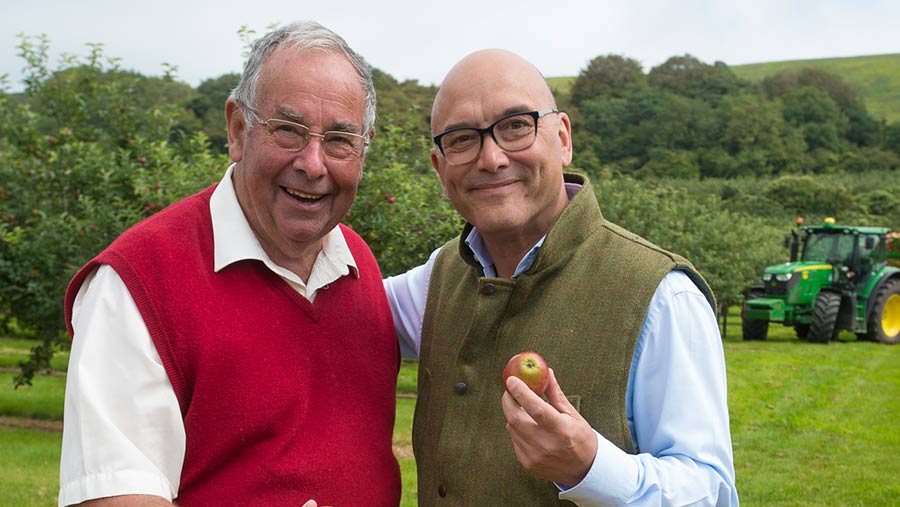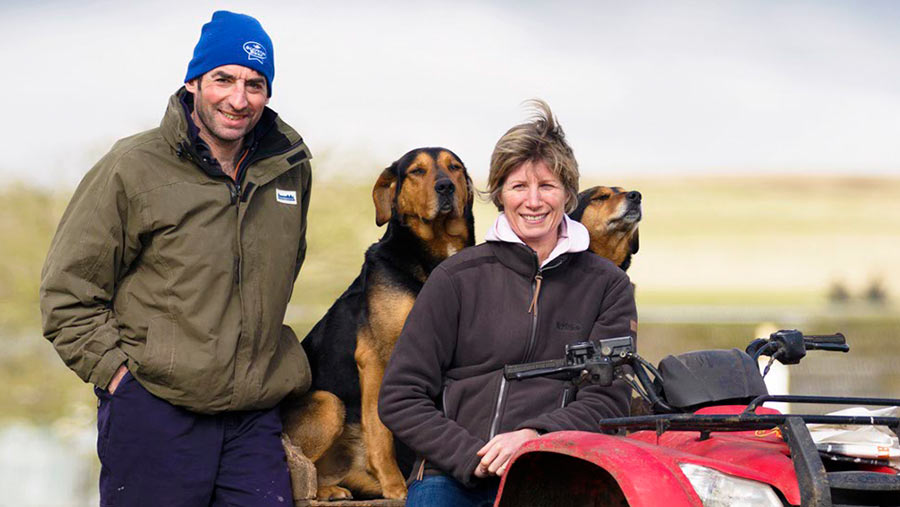Farmers reveal what it’s like to be featured on TV
The farming industry has fought long and hard to get a higher profile on TV.
Now, with agriculture making it on to our screens more, we find out from three people what the experience of being in front of the camera is really like.
Do the benefits of conveying agricultural messages compensate for the commitment in time in takes? What’s it like to become a public figure – possibly even a “star”? And would the people with first-hand experience of the process recommend it to their fellow farmers?
See also: Award-winning Addicted to Sheep to air on TV
The Irvines, This Farming Life

Stephen, Denise, Martin, Melissa and Darren Irvine along with Tilly the dog appeared in the BBC’s This Farming Life © Picture supplied courtesy of The Scottish Farmer
Taking part in a documentary series designed to show people what it’s really like to farm while promoting the industry was a once-a-lifetime opportunity for the Irvine family.
Stephen and Denise, along with sons Darren, Martin and his wife Melissa look after 80 breeding Limousins and 280 mule ewes on a 97ha rented estate at Drummuir, near Keith, Moray, Scotland, where they also look after 600 ewes for the laird.
Cameras followed them for a year as part of the BBC series This Farming Life , which documented the struggles and triumphs of five farming families across Scotland over 12 episodes.
Melissa persuaded her family to get involved after receiving an email appealing for people to take part in the show and they were selected after being filmed by the BBC.
“I thought if that comes on television I’d be thinking we could have done that, so I managed to convince everyone it would be a good thing to let the general public into our lives and show them what farming is really about,” explains Melissa, mum to eight-month-old Erin.
“We didn’t want to sugarcoat it. The series was a great way of advertising what we do and telling people our story – and not just of our family – but farmers as a whole.
The series was a great way of advertising what we do and telling people our story – and not just of our family – but farmers as a whole
Mellissa Irvine
“Since it’s been on, a lot of people have come up to us and said they didn’t realise how much and hard farmers work.”
Prior to filming, the Irvines had to detail their daily routines and work schedules for the year ahead and the crew picked out which bits they wanted to record.
If anything out of the ordinary cropped up, the family would also alert them to it. Even more personal moments such as Melissa and Martin’s wedding were featured in the program.
“The crew were with us two to three times a week,” recalls Melissa, “although it varied depending on what was going on.
“At the start it was a bit strange with them being there, having to think about what you were saying, but we soon got used to it and they became part of the family and part of the farm – in fact we’re still really good friends with them.
“We knew what we were getting ourselves into and right from the start agreed we would show everything – the good, the bad and the ugly. There was no saying: ‘Do you have to film that?’ We just let them see everything and were honest about it.”
“We were filmed on Christmas Day and at our wedding; we never held back from doing our job though and we decided what time things were going to be done.
“Farming’s not nine to five, but the crew were very dedicated and very interested in what we were doing.”
When it comes to the highs and lows of appearing on screen, Melissa says there really weren’t any of the latter. “We were absolutely delighted with how it all turned out. We were quite nervous as we never got to see anything until the first episode aired,” she adds.
“So we didn’t quite know what to expect, but the BBC did an absolutely brilliant job – all credit to them.
“The show’s gone on to win a Scottish Bafta for best factual series and we’re very privileged to have been involved.”
The family received a small “inconvenience” payment for taking part in the series, but Melissa says their involvement was never about money – they just wanted to give people an insight into the realities of the farming industry.
Since taking part, the Irvines have sold a bull as a direct result of the show and they have been inundated with messages, letters, gifts, invitations to judge livestock shows and make after-dinner speeches, all of which took them by surprise.
“Social media went bonkers and after the show aired I couldn’t walk around Tesco without being spotted,” laughs Melissa.
“At the Highland Show we had people queueing up to talk to us. Some call us celebrities, but we are just normal people – that’s how we feel; it’s lovely to hear all the feedback and how much of a difference the show has made and for that we’re very privileged.
“For us the program was a once-in-a-lifetime opportunity. I wouldn’t hesitate if I had to do it all again, but to be honest, we’ve been there now and done that, I want to see other people’s stories and different families having a go.”
Martin Thatcher, Harvest

John Thatcher with Harvest presenter Gregg Wallace
Fourth-generation farmer and cider marker Martin Thatcher says taking part in a television program can be a time-consuming process, but a very worthwhile one. Harvest series hosted by Gregg Wallace and Philippa Forrester in 2015, which celebrated British farming and followed the fortunes of several growers across the country as they battled to bring in their crops.
The Thatcher family has been making cider since 1904 and cameras spent about a year at Myrtle Farm in Somerset – where they grow more than 25 varieties of apples – capturing the story of their Katy variety.
Martin, who works with his father John, agreed to take part after being approached by the BBC and allowed the crew behind the scenes to record all the landmark events in their calendar – including the annual ritual of blessing the apple trees, tree planting and the pressing processes.
The shoot culminated with three intensive days of filming to tie all the footage together.
We made sure we knew what the program was going to be about, and understood what they were trying to do right from the start, explains managing director Martin.
“As well as promoting ourselves, we wanted to make sure the programme showed agriculture in a positive way and the result could not have been any better.
“When it came on the television, it was a very proud moment for us; the whole thing was very positive for the companies featured and the industry in general – and there needs to be more of this.
“The show is one of those things which has gone down in Thatchers’ folklore.”
When it came on the television, it was a very proud moment for us; the whole thing was very positive for the companies featured and the industry in general – and there needs to be more of this
Martin Thatcher
When it comes to highs and lows, Martin says there really weren’t any downsides to the family’s involvement in the program.
He adds that many of the crew have become firm friends, while he and his colleagues enjoyed learning about the process involved in making a television program.
He would, however, advise anyone else thinking about going in front of the camera to make sure they fully understand what they are taking on and that they have the time to dedicate to the project.
“As far as we were concerned there really were no downsides – it was great PR and publicity of our brand, but Harvest did involve days and days of filming,” he adds.
“The BBC was very careful and that’s why the quality is so high. They pay attention to every little detail, which of course does not happen in a quick 30-second shot.
“They will film something five times from different angles to get the perfect shot – a significant amount of time is spent getting it right.
“They talked that all through with us at the start and made it all very clear that quite a lot of time was going to be required.
“We spent three days filming the final bit and they were three long, hard days, but the presenters were fantastic and very patient with us if we got a bit muddled. It was hard work, but it was also great fun.”
Martin, who has been filmed before, didn’t find going in front of the cameras daunting, and if anything felt the way the BBC approached the project made him and his team up their game.
“It was a real eye-opener finding out how much time and effort goes into these things – but it was also very enjoyable too.
“If any other farmer is approached to do it, they should go for it,” he adds.
“It was a very good experience and we learned a lot in that time they were with us.
“There were so many upsides – what you learn, meeting some great people and we helped produce a really good program that millions of people watched and which we were very proud of. It was all very positive.”
The Dykes, Lambing Live

Hamish and Susie Dykes © MacGregor Photography
The decision to appear on live television was not one taken lightly by livestock farmer Hamish Dykes and his family – although they would wholeheartedly recommend the experience to others.
Hamish and his wife, Susie, farm in partnership with his parents John and Kate at South Slipperfield farm in the Scottish Borders, where they played host to the third series of Lambing Live in 2014.
The family breeds pedigree livestock including Simmental Cattle, Bluefaced Leicester sheep and Highland Ponies on 364ha and were followed by cameras for several months prior to four live episodes direct from the farm during March’s busy lambing season.
“I would absolutely recommend the experience to other people,” says Hamish.
“I am sure others might have done something similar and regretted it; we very much trusted the people we were working with, we had a fairly good idea of the story they were trying to portray, and I suppose having seen Lambing Live before, having known the tone of the program, we were comfortable with it all.”
Hamish received an email seeking suggestions for possible hosts, but dismissed the idea until he was approached by the BBC shortly afterwards, when unbeknown to him his family had been nominated by several others.
“Initially, we didn’t think it was for us and I didn’t think my parents would be keen on the idea,” he recalls, “but then someone came up to meet us and then came back to meet Mum and Dad, and by that time we were slightly more interested.
“My parents concluded it wasn’t about them, it was more about our family and children – it was a nice opportunity so we decided to throw our hat into the ring.”
Three families were shortlisted and the Dykes were eventually chosen to take part. A small crew of two kept in constant touch with them, filming routine work such as scanning and dipping the sheep for pre-recorded segments to build into the live shows.
“It was a very small crew – just two people who stayed in a holiday cottage on the farm,” explains Hamish, “and that was one of the most important elements to the whole project and why the pre-recorded films come across as well as they do; it was just like having friends come and stay.
“It wasn’t daunting talking to the camera, although the live element is completely different as there was a huge amount of people – about 70 – plus lorries, trucks and equipment; it was amazing how seamless and easy it all was.
There was the satisfaction that it was great; we didn’t want to hide anything and were happy to show the warts-and-all, and paint a genuine picture of farming life
Hamish Dykes
“And despite all these people milling around, there wasn’t a single moment I wished they would all go away – they just knew how to get the job done without interfering, so we could get ours done.”
Although the family wasn’t able to watch the series first-hand, they were delighted with how it turned out and all the positive feedback it received.
Hamish says the whole experience was a positive one and is particularly pleased with how one segment – showing lambs going to the abattoir – was portrayed and received.
“What goes up must come down though” he adds. “We were on an absolute high emotionally, with all those people around us and then, once the program kicks off, there are all the well-wishers and congratulatory messages.
“There was the satisfaction that it was great; we didn’t want to hide anything and were happy to show the warts-and-all, and paint a genuine picture of farming life.
“And then we went back to work and there was just this big empty space – that was hard; both Dad and I took a dip after the show.”
The family wasn’t paid for taking part in the show, but was compensated for expenses incurred as a result of it.
Since appearing, they have had to get used to being recognised more and have also been able to install a camera in the lambing shed.
“It’s not really had much of an effect on the business,” says Hamish, “although there have been some other opportunities like the lambing camera.
“Lambing Live was a great experience – it gave us the opportunity to help promote the industry and what we do and that’s why we wanted to do it.”

